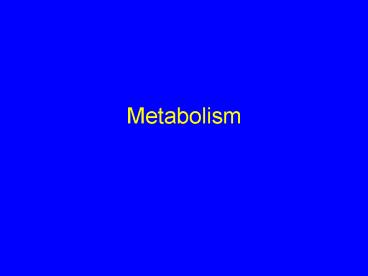Metabolism - PowerPoint PPT Presentation
1 / 14
Title:
Metabolism
Description:
Excess carbohydrate used to fill glycogen stores ... Thermic effect of food. Physical activity. Basal Metabolism. Basal metabolism ... Thermic Effect of Food ... – PowerPoint PPT presentation
Number of Views:62
Avg rating:3.0/5.0
Title: Metabolism
1
Metabolism
2
Feasting
- Feasting adds to body stores of carbohydrate and
fat - Excess carbohydrate ? used to fill glycogen
stores ? excess glucose stored as fat - Excess fat ? stored as fat
- Excess protein ? remove N and store as fat
3
Fasting Glycogen Available
- Draw upon stores during fasts (even short-term)
and during exercise - Liver glycogen ? blood glucose ? energy for all
cells - Muscle glycogen ? muscle glucose ? energy for
muscle cells
4
Fasting Glycogen Available
- Draw upon stores during fasts (even short-term)
and during exercise - Fat stores ? fatty acids in blood ? provide
energy for all cells, but brain and CNS
5
Fasting Glycogen Stores EMPTY
- Only protein and fats are available as a source
of energy - See board!
6
Estimating Energy Needs
- Body uses energy for
- Basal metabolism
- Thermic effect of food
- Physical activity
7
Basal Metabolism
- Basal metabolism
- Energy needed to maintain the body at complete
rest (physical, emotional, and digestive) - Largest component of daily energy expenditure
8
Basal Metabolism
- Basal Metabolic Rate (BMR)
- kcal burned per hour per kg body weight
9
Basal Metabolism
- BMR impacted by
- Lean body mass
- More LBM, the higher your BMR
- More fat, the lower your BMR
- Age and gender (related to LBM)
- BMR slows with age
- BMR higher in males
10
Basal Metabolism
- Height
- Taller, thinner people have a higher BMR
- More surface area to support
- Fever raise BMR
- 10 F fever raises BMR by 7
- Fasting and malnutrition lower BMR
11
Basal Metabolism
- Smoking and caffeine raise BMR
- Stress raises BMR
12
Thermic Effect of Food
- TEF energy needed to digest, absorb, transport,
and metabolize nutrients - Smallest component of daily energy expenditure
- 10 caloric intake
13
Physical Activity
- Physical Activity energy needed to support
voluntary activity - Energy required impacted by
- Muscle mass
- Body weight
- Nature of activity
- Duration, intensity, frequency
14
Energy Expenditure
- Summary
- To maintain energy balance, energy input must
balance energy expenditure - Expend energy to
- support basal metabolism
- process foods (TEF)
- support physical activity































